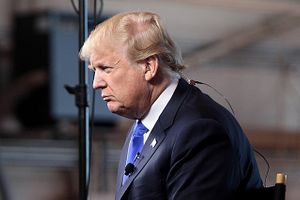The election of Donald Trump as the next president of the United States poses a potential for disruption in the Asia-Pacific region and to Australia’s engagement within it, thanks to a number of Trump’s previously stated positions. Australia, through its primary strategic alliance, is wedded to U.S. enforcement of the current rules-based order in the Asia-Pacific region for its own domestic security, trading routes, and trading aspirations. Any retrenchment of the United States from the region, or dramatic shifts in present U.S. engagement, would undoubtedly have to signal a responsive shift in Australian foreign policy.
After the election results were announced, Australia’s Foreign Minister Julie Bishop attempted to reassure both the forthcoming U.S. administration and the Australian public of the importance of the security alliance by stating that “Australia is considered a strong and reliable ally of the United States and I expect that a Trump presidency would continue to regard Australia in that light.” She further urged the president-elect to maintain the status quo, saying, “We acknowledge that the United States has been the guarantor of peace and security and stability in our region and we would certainly appeal to any incoming administration for the United States to maintain that role.”
While Australia maintains a hope that the status quo will be protected, the country’s recent moves toward creating a high-tech native defense industry could be viewed as a hedge against U.S. domestic instability and the potentially uncertain future direction of U.S. foreign policy. With the election of Trump, formulating a new national security strategy, one that relies more on Australia’s own capabilities, may become a more pressing concern for Australian defense strategists.
A new strategy could become essential even if the Trump administration reaffirms its commitment to the ANZUS alliance, but does not offer the same commitment to U.S. allies in Japan and South Korea. Trump’s accusation that its Northeast Asian allies are “freeloading” under the U.S. nuclear umbrella has the potential to escalate tensions in the region. Were Japan to not feel secure in U.S. commitment to its defense, the potential for Tokyo to remilitarize and to create a domestic nuclear capability will increase. This would cause serious concern in Beijing, Seoul, and Pyongyang, all of which would likely respond with their own increased militarization.
Any escalation of tensions in Northeast Asia will not only have a destabilizing effect on the Asia-Pacific region as a whole, but could have a direct and possibly dramatic effect on Australia’s economy. China, Japan, and South Korea are three of Australia’s four biggest trading partners (the United States being the other). Maintaining peaceful trade routes in the region is imperative for Australia’s interests.
Trump’s proposed 45 percent tariff on Chinese goods has to be a further concern for Australia’s policymakers. Although China is beginning to realize the need to shift its growth model toward greater domestic consumption, Beijing still relies heavily on its ability to export a large amount goods for its continued development. Restricting access to the world’s largest economy has the potential to greatly undermine China’s development — the same development that sees China procure a great amount of raw materials from Australia, and has been a key driver of Australia’s recent prosperity.
The ascendancy of Trump also poses significant domestic concerns for the Australian government in its ability to maintain the country’s open trade and skilled immigration policies, the latter of which is deemed another major factor in Australia’s present-day prosperity.
Already the nativist One Nation party has hailed Trump’s win as a major victory within their culture war, and there are elements within conservative Coalition government who also see Trumpism as a sentiment to encourage. This has the potential to send a shockwave through Australian politics similar to the one that just swept through the United States.
The current conservative Coalition government is not just a coalition of parties. Within each of these parties lies a coalition of ideas that are now in direct conflict with each other: a desire for a nostalgic cultural homogeneity and the exponential change machine that is freer trade. The modern conservative belief in the latter has been able to temper its more reactionary elements, but if conservative ideology shifts back to a strong protectionist sentiment it has the potential to become a far more narrow and dangerous force, as well as an economically diminishing one.
How Prime Minister Malcolm Turnbull, a man who embodies the modern cosmopolitanism so rejected by Trumpism, deals with this reshaping of modern politics, as well as the potential security and economic threats that may emerge from a Trump presidency, will be a significant test of his prime ministership.
Australia has been able to create a hugely prosperous society despite its domestic political culture due to a stable regional order allowing it to trade relatively freely with Asia’s established and emerging economies. Turnbull and the rational actors within his government will be hoping that President Trump is able to rein in the rhetoric of his campaign and govern within the bounds of the established norms that have served Australia well.

































